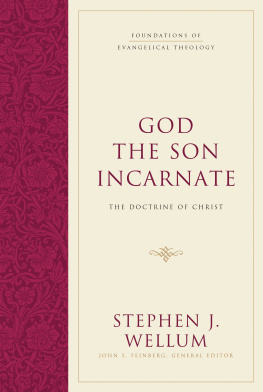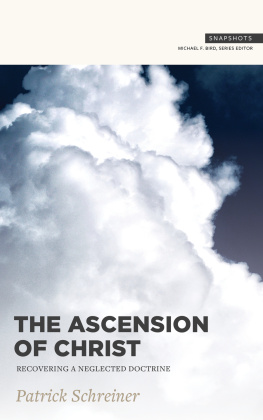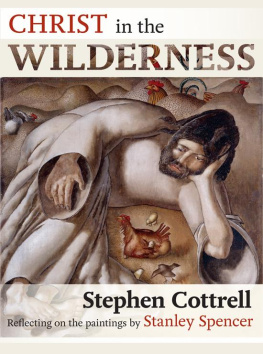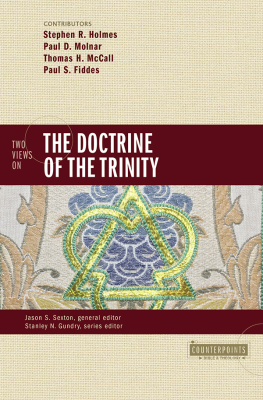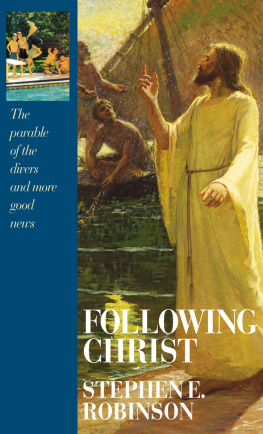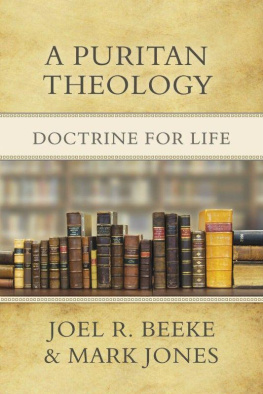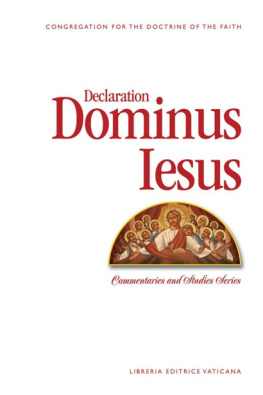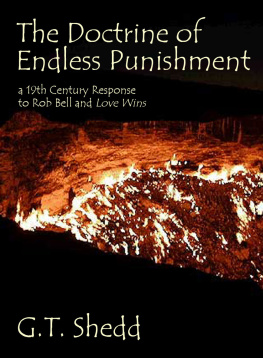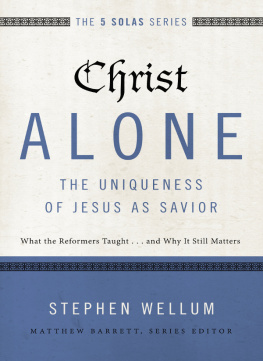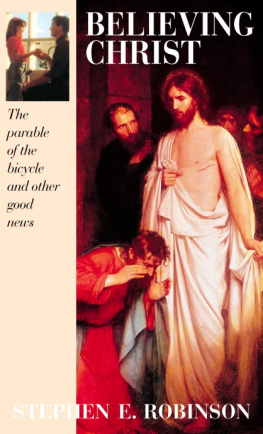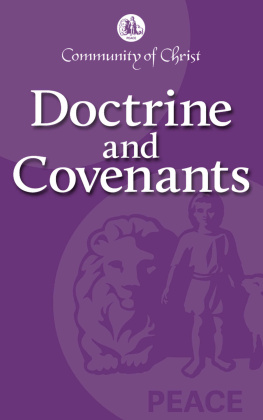Stephen J. Wellum - God the Son Incarnate: The Doctrine of Christ
Here you can read online Stephen J. Wellum - God the Son Incarnate: The Doctrine of Christ full text of the book (entire story) in english for free. Download pdf and epub, get meaning, cover and reviews about this ebook. year: 2016, publisher: Crossway, genre: Religion. Description of the work, (preface) as well as reviews are available. Best literature library LitArk.com created for fans of good reading and offers a wide selection of genres:
Romance novel
Science fiction
Adventure
Detective
Science
History
Home and family
Prose
Art
Politics
Computer
Non-fiction
Religion
Business
Children
Humor
Choose a favorite category and find really read worthwhile books. Enjoy immersion in the world of imagination, feel the emotions of the characters or learn something new for yourself, make an fascinating discovery.
- Book:God the Son Incarnate: The Doctrine of Christ
- Author:
- Publisher:Crossway
- Genre:
- Year:2016
- Rating:4 / 5
- Favourites:Add to favourites
- Your mark:
- 80
- 1
- 2
- 3
- 4
- 5
God the Son Incarnate: The Doctrine of Christ: summary, description and annotation
We offer to read an annotation, description, summary or preface (depends on what the author of the book "God the Son Incarnate: The Doctrine of Christ" wrote himself). If you haven't found the necessary information about the book — write in the comments, we will try to find it.
God the Son Incarnate: The Doctrine of Christ — read online for free the complete book (whole text) full work
Below is the text of the book, divided by pages. System saving the place of the last page read, allows you to conveniently read the book "God the Son Incarnate: The Doctrine of Christ" online for free, without having to search again every time where you left off. Put a bookmark, and you can go to the page where you finished reading at any time.
Font size:
Interval:
Bookmark:
Thank you for downloading this Crossway book.
Sign-up for the Crossway Newsletter for updates on special offers, new resources, and exciting global ministry initiatives:
Crossway Newsletter
Or, if you prefer, we would love to connect with you online:
|
|
|
|
Chapter
Twelve
In the last chapter, we described the spectrum of thought within current evangelical kenoticism. and thus more problems result.
The Chalcedonian Definition and the Burden of Proof
Even though
Problems with OKCs Theological Method
One of the critical problems for ontological kenotic Christology is its redefinition of the divine nature. Before we turn to the reasons for this assessment, let us first reflect on OKCs theological method for determining the essential-accidental distinction in God. What warrant do they give?
For example, given that Jesus is described as growing in knowledge, ignorant of certain events, and limited in power, Feenstra proposes that our understanding of omniscience, omnipotence, and all of the divine attributes must be defined in light of Christ. On this basis, OKC argues that omniscience, omnipotence, and omnipresence are not essential to deity: these attributes only apply to God simpliciter , i.e., plainly and without qualification, apart from the incarnation.
But is this method correct? Feenstra is correct that we must theologize about the divine nature from Scripture, but is it correct to move from the incarnation to theology proper? To what extent does the incarnation dictate our understanding of Gods nature? As plausible as it may sound, this approach is problematic and reductionistic. Why not? Vanhoozer gives two important reasons.
First, Jesus Christ reveals God neither de novo nor ex nihilo . On the contrary, the identity of Jesus is inextricably tied up with the identity of God already established by his covenant with Israel. judgment, and ultimately finds its fulfillment in Christ. As one moves from creation to Christ, the triune God discloses more about himself, and even though Gods plan reaches its fulfillment in the incarnate Son, Gods fundamental nature does not change. What God is prior to the incarnation is in direct continuity with what he is after the incarnation. In fact, we know what Gods nature is , and thus what it means for the Son to be fully God, only in light of Gods self-description in the Old Testament. It is too reductionistic to begin with Christ and work backwards. All Scripture is our norm, starting in creation, and it is the entire canon that defines Gods nature.
Second, one cannot consistently apply this Christological reduction, since Jesus is both God and man, the Son who subsists in two natures. This demands that we must distinguish actions and characteristics that are divine and those that are human. As Vanhoozer observes, If Jesus history completely revealsor, what is more, constitutesGods very being then it becomes difficult to identify which properties are human and which divine. Does the incarnate life of Jesus reveal that God is a sleeper (because Jesus sleeps)? Yes, Jesus reveals God in bodily form (Col. communicatio ). But in predicating human attributes to the person, we must preserve the fact that the one person is also deitythe nature of which we discover from all of Scripture.
Why is this option not better? It makes more sense of Scripture, it requires no redefinition of Gods nature, and it is consistent with the consensus of the church. There is simply no reason to reinvent theological method as OKC attempts to do.
Problems with Redefining the Metaphysics of the Incarnation
Problems with the Divine Nature
There are at least two reasons to reject its proposal.
First, OKCs view is not really an improvement on earlier kenotic views, in that it lacks serious biblical warrant. What
Second, OKCs view is arbitrary and inconsistent. As
Problems with Person
What about both views understanding of person? Even though FKC disagrees with OKC regarding the divine nature, in agreement with OKC over against classical thought it redefines person in more contemporary terms: a distinct center of knowledge, will, and action, thus placing the capacities of will and mind in the person rather than in the nature.does not place the capacities of will and mind in the person but in the nature. It views the person as an agent, or an I who subsists in a rational nature. This is why the classical view insists that the divine Son, in assuming a concrete human nature, became human by adding to himself a human body and soul (including a human will and mind), and as a result, is now able to live a fully human life in and through the capacities of his human nature. In addition, the classical view also affirmed that the incarnate Son is not limited to living his life merely through his human nature because, as the Son, he continues to possess the divine nature in relation to the Father and Spirit, and is thus able to continue to live a divine life (thus the extra ).
Why do both kenotic views reject the traditional view of person? A number of reasons are cited, but the most significant is that the classical view leads to Is this charge correct? How do we resolve the differences between a classical view of person and the current one? Let us focus on three points.
First, in the literature there is often confusion regarding the classical view. Almost uniformly the charge is that it is Nestorian, but the church consistently rejected Nestorianism by holding to a classical view of person, whether at A better explanation for the charge is either a misunderstanding of the classical view or the assumption that the only viable definition of person is the current one, which is then read back on the earlier discussion.
Evidence for this latter explanation is not hard to find. For example, in the discussion of person-nature there is a lot of confusion. each person with his own distinct will and mind.
Today, it is on the subject of the will and mind that the current view of person differs most significantly from the classical. monothelitism).
thus entailing two wills in Christ, one for each nature.
This is also why pro-Nicene theology insisted that the divine persons act inseparably, i.e., the Father, Son, and Spirit act according to their eternal relations (mode of subsistence) but in virtue of their common nature, and consequently the effects of the divine action always have for their source the entire Trinity. Thus, the Father, Son, and Spirit all act , yet they act in and through the capacities of the one single divine nature that they equally possess and share. Because the nature is where the capacity of willing is located, we can say that the three persons act as distinct persons according to their eternal-immanent relations, in and through the capacities of the divine nature, which includes the same will. As this understanding is applied to Christology, the classical view affirms that the one person, the divine Son, given that he has two natures, also has two wills in terms of (3) and not (2). In Christ, then, the divine Son is the acting agent who acts in and through his natures, and now, as a result of the incarnation, is able to act as a man according to his distinct human will . This is why the divine Son can now live and experience a fully human life, even though he is not entirely circumscribed or limited by his human nature because he continues to subsist in the divine nature. If these distinctions, however, are not acknowledged, it is no surprise that there is confusion regarding the classical view, and why current views (which place (2) and (3) in person) constantly raise the Nestorian charge.
Next pageFont size:
Interval:
Bookmark:
Similar books «God the Son Incarnate: The Doctrine of Christ»
Look at similar books to God the Son Incarnate: The Doctrine of Christ. We have selected literature similar in name and meaning in the hope of providing readers with more options to find new, interesting, not yet read works.
Discussion, reviews of the book God the Son Incarnate: The Doctrine of Christ and just readers' own opinions. Leave your comments, write what you think about the work, its meaning or the main characters. Specify what exactly you liked and what you didn't like, and why you think so.

